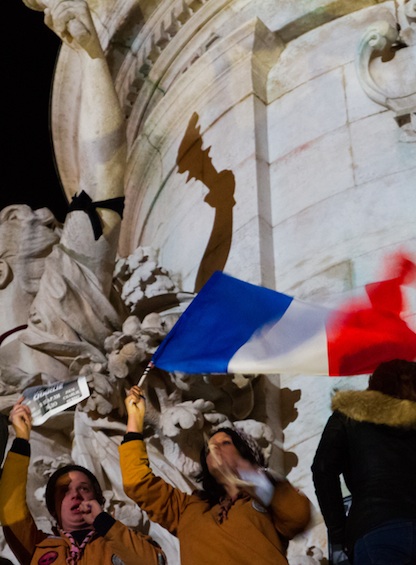Charlie Hebdo and the Project of French Identity
What to do when you are no longer the next universal vision for humanity?
January 16, 2015

In the age of globalization, brand has become more important than where something is made. Quality counts, but it is the brand you buy into.
How well the French understand this. They remain tenacious on EU laws that aggressively defend their marques of origin like the bubbly “Champagne.” France is, after all, a nation of immortal brands – so much so that they seem to undergird French national identity itself.
Simply, for the national brand to be sustained, France must also grow, but here the country’s dilemma reveals itself — the demographic markets for growth are mostly in Muslim lands.
Moreover, those who must ultimately become French hail from the realm of the former colonized regions, that is, the former oppressed and excluded and their offspring.
The legacy of imperialism makes it very hard to preserve the vision of the French Revolution and to shape it into “universalism in one country”
Why some countries grow
Fertility is in trouble in most of Europe. Germany, a society of well over 80 million people, stands right now to shrink by 12 million, to 72 million by 2060. Ditto Italy, Eastern Europe, etc.
France and Britain in contrast stand to grow, to 72 and 77 million by 2060. Why? In part because of stronger fertility rates among their immigrants — a wholly unexpected historical bounty of Victorian-era imperialism.
Current demographic projections show both Britain and France outpacing Germany in the next half century. Good economic news for them. But will new citizens buy into the brand?
Frenchmen (and women) know better than anyone that the nature of “value” in this age of globalization lies in authenticity and identity. Hence, to be part of La Grande Nation demands the realization of a state of mind. Those who embrace it fully are thus made French — or so it is said.
But there is a big downside here. Branding has to work, or the whole effort just fails. It is no less than an indelible cultural imprint on every prospective French citizen.
France as we know it cannot continue for long if Gaulois hearts beat to another drummer. This seems like a simple truth, and it goes for Americans as much as the French.
If the future for France therefore is in making more Frenchmen and women, the terrifying point of the Charlie Hebdo attacks is that these citizens are not really French in spirit. They are at best imposters.
Algeria is part of France!
The existential parting of France and l’Algérie seems so far away now, but it brought down the 4th Republic and represented an utter defeat for French identity — or so it seemed at the time. Reality since might revise that initial judgment.
Millions of Algerians have come to France, and the nation is both bigger and stronger for it. Some of those who came were Pieds Noirs, but many more since have been Francophone Arabs.
What counts here is the recognition that France has not — and will probably never — escape its aggressive era of colonialism in Africa.
France was removed from Africa, but Africa, especially Algerian North Africa, has come to France. France is in this sense an Arab and African nation as much as a European nation (this is a paradox, of course, that the United States still struggles with).
The deep problem is that French colonialism tried to have it both ways, and is now getting it both ways. As they arrived and asserted domination, the colonizers focused on differentiating French masters from new French subjects.
At the same time, they could not resist giving an ideological high-gloss to their enterprise: Meaning, bringing the glories of French universalism to the Jeune Afrique.
France, in other words, created the basis for future equality among those they treated wholly unequally. Hence, France created the fertile loam of an ever-growing France to come.
But this can only happen if the new Frenchmen and women make France their own — and the legacy of colonialism is that Frenchmen to date have not been particularly good at that.
The embrace is hard, but it must be made if France is to have a future. Charlie Hebdo scratches at the fissures and fault lines in the yet unresolved offer to new and prospective Frenchmen.
In that regard, it is just like Ferguson, Missouri, which exposed the persistent American unwillingness — still — to embrace those we brought here as chattel slaves. How do you learn to love those you had once so rigorously objectified as the other?
“Universalism in One Country”
The French Revolution instantiated a blazing, flaming universalism that had not been seen since either late Roman Christianity or the 7th century surge of Islam.
But after the party, after the hangover, what does a nation do when it realizes that it really is no longer the next universal vision for humanity? When it realizes that it really, really wants to keep and enshrine the special and intimate things that make it special and meaningful to its own people?
The French hangover — disengaging from universalism after Napoleon — was eventually shared by Britain, America and Russia.
When Stalin declared “Socialism in One Country” in 1925, his quest, his little sound bite may best encapsulate the very difficult transition that grandiose modern nation states have had to make from unswerving universalism to the face-saving “universalism in one country.”
What does “universalism in one country” mean in successful practice? Just this: That the identity offering which you make to those who want to embrace the vision is real and will be realized: That anyone can belong to your community.
As things stand, Britain and France, as preeminent colonial empires, have been less than successful in fulfilling the offering.
Yet, the offering is everything. The risk in making such an offering, if not authentically realized, is exactly what we see in the Euro-flight of eager warriors to the Islamic State: Young Muslim Brits and Frenchmen look to another identity — another offering.
This is nothing less than a transcendental failure of the national offering (universalism in one country), and it could undermine both the British and French national futures.
What this suggests is the need for France to make — for want of a better characterization — a better offering made real.
France really has no choice: Make the progeny of colonialism yours, embrace them truly, and all will [eventually] be all right. Continue to treat them like you do now — and the future promises only heartache and pain.
Takeaways
France is a nation of immortal brands.
The legacy of imperialism makes it very hard to preserve the vision of the French Revolution.
Current demographic projections show both Britain and France outpacing Germany in the next half century.
Millions of Algerians have come to France, and the nation is both bigger and stronger for it.
How do you learn to love those you have once so rigorously objectified as the other?

